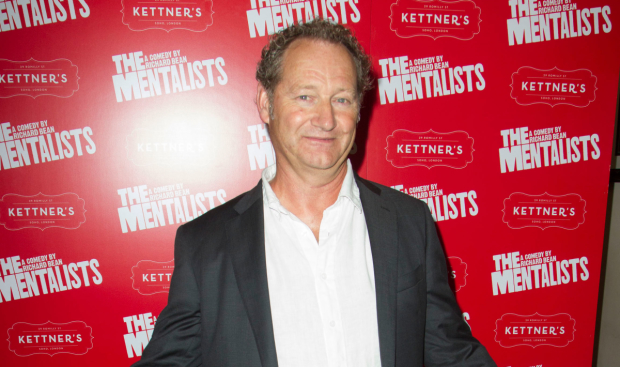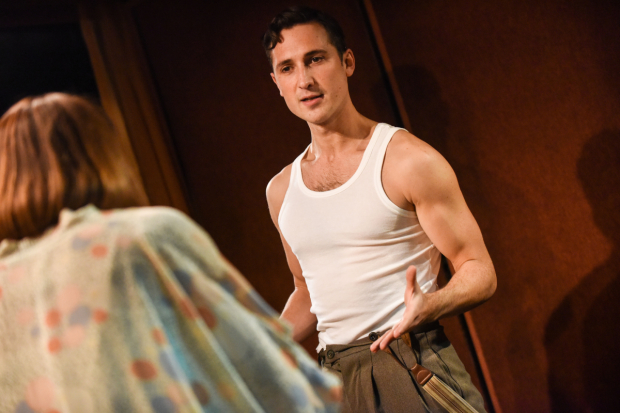Richard Bean: 'I'm not superstitious, but I don't like the colour green'
We talk to the playwright about his play ”Kiss Me” which opened at Trafalgar Studios this week, why he doesn’t say ‘break a leg’ and his upcoming play at the new Bridge Theatre, ”Young Marx”

© Dan Wooller for WhatsOnStage
Would you describe Kiss Me as a love story?
Kiss Me is a forbidden love story in the sense that the young man has his visit brokered by a female doctor who is providing an introduction service to war widows. This is after the First World War when there was only the old-fashioned way of getting pregnant. His behaviour is controlled by the doctor by a set of parameters, no kissing, only visit once, and don’t fall in love.
It feels as though this isn’t your usual territory, why a love story?
I’m human, I have known love, the joy and the pain of it. I have dramatised love many times in my plays most notably in Honeymoon Suite. I guess for the stage, happy contented love is not very dramatic, so playwrights are more interested in conflict, break up, and loss.
The show originally opened in Hampstead Downstairs, which doesn’t usually open for press, were you delighted that it has been given the opportunity for a further life?
I was delighted by the public response to the play which, because Hampstead Downstairs is not reviewed, one hears in the bar, and through Twitter. I don’t tweet so people had to send me the tweets, which made me think that the play deserved a future.
Would you describe Kiss Me as funny?
There are two human beings in a room and they don’t know we’re there, the audience, so it’s always funny. I’ve always thought that a play is when you just take the fourth wall away and look in the window. I didn’t write it as a comedy, but it’s funny enough to tickle along.
You’re back at Hampstead after a ten year break – what took you so long to return?
After In the Club I had four plays on the National Theatre main stages and that feels, for a playwright, like playing for England. The National can be very seductive and well-resourced with long rehearsals and great talent working your script to production.
You began your relationship with the stage as a stand up, do you miss it?
I wish I’d started stand-up as a younger man. I was into my 30s and, for example, Stewart Lee would have been early 20s. I lacked the commitment necessary and cared too much whether the audience liked me. Genius comedians like Lee, and Simon Munnery couldn’t give a damn what the audience think of them.
What skills do you use as a playwright that were also handy as a comedian?
I think the main instinct is to know pretty much all the time what the audience will be thinking and feeling. As a playwright, you can use this to give the audience the emotions you want them to feel, and you do this to serve your storytelling ends.

© Robert Day
You have Young Marx due to open as the first play at the new Bridge Theatre – does it feel like a big responsibility?
The main way of judging a play is to ask "does it work?" There are many different ways for a play to work. The usual ones are laughter or emotional catharsis. I think with Young Marx there’s enough of both to say it works.
You’re teaming up again with Nicholas Hytner, is it fair to say you guys work well together?
Yes, we do work well together. He’s a great director but also a very good dramaturg. And he is a man that projects faith, in the sense of faith in you.
What are you most looking forward to in that project?
Seeing that world of 1850s Soho teeming with revolutionary immigrants from Europe, the poverty, the struggle, and to see a young man, a punk Marx, a man that we normally think of as a wise old beard.
What made you initially want to turn your hand to playwriting?
I saw David Storey’s play The Changing Room and the structure of it opened my eyes to how I might tell the story of my year off working in a mass production bakery in Hull. I stole Storey’s structure and the play was called Toast.
You originally studied psychology, do you think your experience of studying that has fed into your work?
A bit, but not as much as my year working in the mass production bakery in Hull. The intensity of the social relations in making a factory work, the language, the dialogue, the subjects under discussion, blew my mind. I wasn’t sheltered or even middle class but I wasn’t ready to contribute to a discussion such as whether eskimos were any good at sex. And that was a subject that the men in that factory, being ex–trawlermen, knew about.
You recently staged The Hypocrite in Hull, was it fun writing about your home city?
It is the obligation of all writers to honour the city that made them, and so from that point of view, I didn’t think about it, I just got on with it and tried to make the subject mine, which is why it ended up as a sex farce with a punk band.
Are you superstitious and if so is there a theatre superstition you follow?
No I’m not superstitious really. I don’t like the colour green but that is a Hull thing, not a theatre thing. Green is death, the colour of the sea. Hull city council have no green paint in their stores. As a writer you are a little on the periphery of the theatre culture and all that bull about the smell of the greasepaint means nothing to us. I go to first nights, and usually enjoy them, I don’t like Saturday night audiences because they don’t want to be there. I conform because it’s easier to conform than to rebel so I would call Macbeth the Scottish play, but I’d do that for the sake of other people. I don’t say break a leg as it just sounds a bit naff. I say, "have a good one" which is what stand-ups say to each other, even though they hate each other. I saw an actor break a leg on stage once, and often wondered if anyone had said to him "break a leg" before he went out.
What was your first big break, in your eyes?
The National read Toast and couldn’t do it but got the Royal Court involved and they did it as a co-production. Me and Roy Williams in that season. And we’ve both done alright.
Do you have a career highlight to date?
There are many unforgettable nights. When Harvest first previewed at the Royal Court there were 'standers' as in standing ovations in the auditorium. I’d never had that in preview and knew that that was something special. One Man, Two Guvnors press night was very special. But one of my fondest memories is a script in hand reading of Smack Family Robinson in an old fruit market warehouse in Hull. It was directed by Gareth Tudor Price and the producer had oversold tickets so there were about 200 in a space for 150. It stormed it, and a woman fainted, and there was a commotion and the audience chose their own interval, and then we carried on and I was laughing because I was watching Richard Wilson’s face, he’d never seen anything like it.
What’s the best advice you’ve ever been given?
Write the play that you want to see.
Do you read reviews?
I used to. But I don’t now. I learned this lesson because I thought it would be safe to read a five star review of One Man, Two Guvnors but the critic hurt me by saying that the second half is not as good as the first half. Wounded.
If you could swap places with anyone for a day, who would it be?
Joe Root
Kiss Me runs at the Trafalgar Studios until 8 July.













